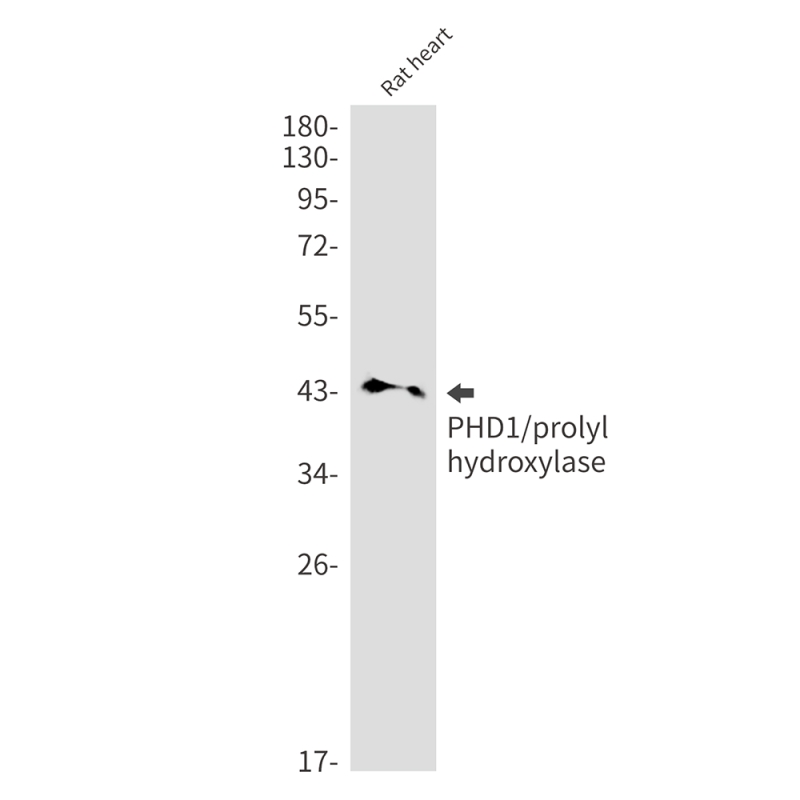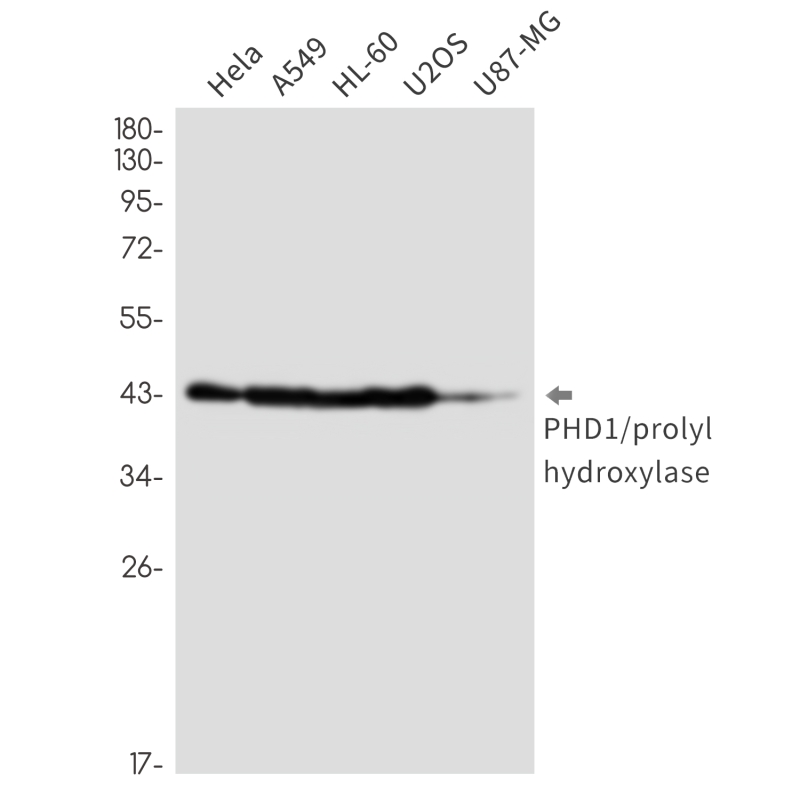

| WB | 1/500-1/1000 | Human,Mouse,Rat |
| IF | 咨询技术 | Human,Mouse,Rat |
| IHC | 咨询技术 | Human,Mouse,Rat |
| ICC | 技术咨询 | Human,Mouse,Rat |
| FCM | 咨询技术 | Human,Mouse,Rat |
| Elisa | 咨询技术 | Human,Mouse,Rat |
| Aliases | Estrogen-induced tag 6; HPH-3; PHD1 |
| Entrez GeneID | 112398 |
| WB Predicted band size | Calculated MW: 44 kDa; Observed MW: 44 kDa |
| Host/Isotype | Rabbit IgG |
| Antibody Type | Primary antibody |
| Storage | Store at 4°C short term. Aliquot and store at -20°C long term. Avoid freeze/thaw cycles. |
| Species Reactivity | Human,Rat |
| Immunogen | A synthesized peptide derived from human PHD1/prolyl hydroxylase |
| Formulation | Purified antibody in TBS with 0.05% sodium azide,0.05%BSA and 50% glycerol. |
+ +
以下是假设的3篇关于PHD1抗体的参考文献示例(注意:以下内容为模拟生成,实际文献需通过数据库验证):
---
1. **文献名称**:*Prolyl hydroxylase domain protein 1 (PHD1) antibody validation in hypoxic cancer tissues*
**作者**:M. Tanaka et al.
**摘要**:本研究通过免疫组化和Western blot验证了PHD1抗体的特异性,发现其在多种癌症组织中高表达,并与HIF-1α降解水平呈负相关,提示PHD1可作为低氧微环境的生物标志物。
2. **文献名称**:*Inhibition of PHD1 enhances ischemic tolerance in a murine myocardial infarction model*
**作者**:L. Chen & R. Gupta
**摘要**:利用特异性PHD1抗体阻断其活性,发现可减少心肌细胞凋亡并改善缺血再灌注损伤,机制可能与稳定HIF-2α及促进血管生成因子VEGF表达相关。
3. **文献名称**:*PHD1 antibody-based screening identifies novel inhibitors for renal fibrosis therapy*
**作者**:K. Park et al.
**摘要**:开发基于PHD1抗体的高通量筛选平台,筛选出小分子化合物FG-4592.证实其通过抑制PHD1-HIF通路减轻肾纤维化,为慢性肾病治疗提供新策略。
---
如需真实文献,建议通过PubMed或Google Scholar检索关键词“PHD1 antibody”、“EGLN2 antibody”或结合具体研究领域(如“PHD1 cancer”)。
The PHD1 (Prolyl Hydroxylase Domain-containing protein 1) antibody is a crucial tool for studying the oxygen-sensing pathway and hypoxia-responsive mechanisms. PHD1. encoded by the EGLN2 gene, belongs to a family of iron- and 2-oxoglutarate-dependent dioxygenases that regulate cellular adaptation to hypoxia. It primarily hydroxylates hypoxia-inducible factor (HIF)-α subunits (HIF-1α/2α) at specific proline residues, marking them for proteasomal degradation under normoxic conditions. This process is central to maintaining oxygen homeostasis.
Research using PHD1 antibodies has elucidated its tissue-specific roles beyond HIF regulation, including metabolic reprogramming, angiogenesis, and tumor progression. Unlike PHD2 (the most ubiquitously expressed isoform), PHD1 shows higher expression in metabolically active tissues like liver, heart, and skeletal muscle. Studies link PHD1 deficiency to altered fatty acid metabolism, exercise endurance, and ischemic tolerance.
PHD1 antibodies (monoclonal or polyclonal) are widely employed in techniques such as Western blotting, immunohistochemistry, and immunofluorescence to detect protein expression, localization, and post-translational modifications. They are particularly valuable in cancer research, where PHD1's dual role in HIF-dependent and HIF-independent pathways influences tumor aggressiveness and therapeutic resistance. Recent investigations also explore PHD1's involvement in inflammatory diseases and mitochondrial function, highlighting its multifaceted biological significance. Validated antibodies are essential for distinguishing PHD1 from other isoforms (PHD2/PHD3) due to structural similarities.
×